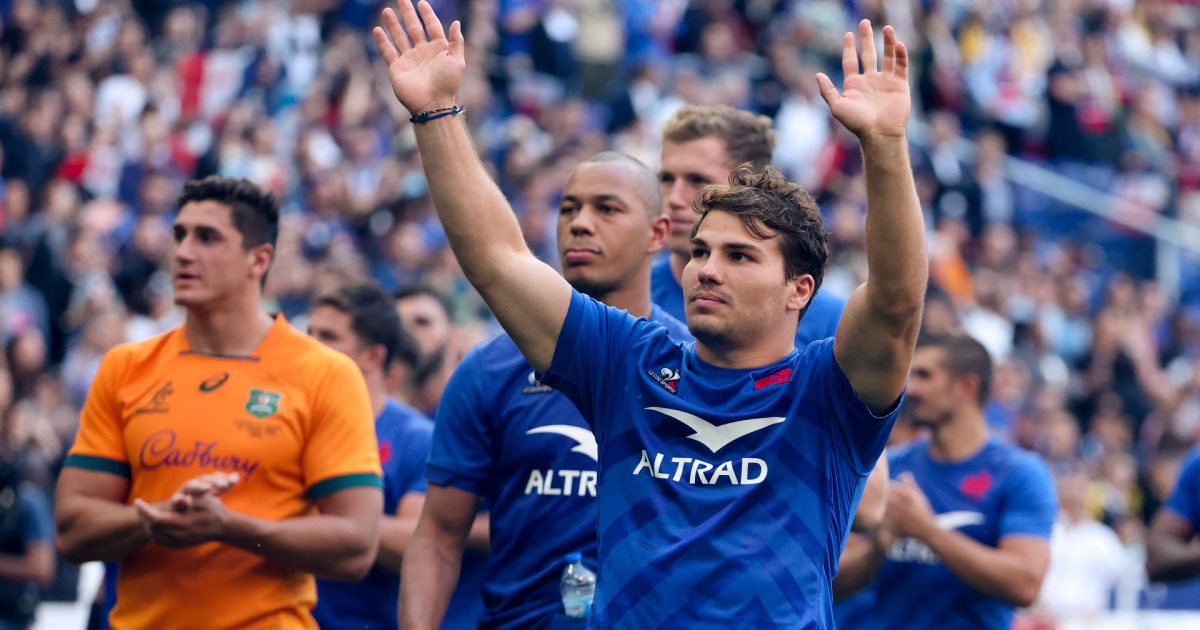Mais au fait, c’est quoi la « loi Dupont » ?

Les nouvelles règles annoncées par World Rugby le mardi 19 mars ont rapidement fait réagir le microcosme du rugby. Avec, en exergue, l’abolition à venir d’une faille exploitée par de nombreux joueurs, Antoine Dupont en tête. A tel point que les Anglo-saxons l’ont surnommée « Dupont law ». Mais de quoi parle-t-on vraiment quand on évoque cette « loi Dupont » ?
On peut sans difficultés retracer l’origine de cette appellation. Elle est apparue pour la première fois dans la bouche de Bernard Jackman. L’ancien talonneur, qui a notamment entraîné Grenoble entre 2011 et 2017, est désormais consultant sur RTÉ Sport, la télé publique irlandaise. Il a évoqué cette manière d’exploiter la règle à la suite de la rencontre pays de Galles – Écosse du 3 février dernier (26-27).
« On appelle ça la ‘loi Dupont’ car il y a un an et demi, le capitaine français Antoine Dupont est allé voir l’arbitre avant le match pour lui expliquer que lors d’un échange de ping pong rugby, les joueurs n’avaient pas à se replier dans leur camp, tant qu’ils restent statiques », informait alors Jackman.
« Il faut que le réceptionneur du ballon parcoure cinq mètres ou effectue une passe pour remettre les adversaires en jeu. »
« C’était très malin de la part de Dupont, et maintenant tout le monde le copie. Il faut que ça change, parce que personne ne veut voir des échanges de coups de pied de 50 m », estime l’ancien Leinsterman.
Mais à y regarder de plus près, il semble que le demi de mêlée du Stade Toulousain et des Bleus n’a pas été le premier à constater ce vide juridique. « Incroyable qu’on appelle ça la ‘loi Dupont’ alors que d’autres équipes le faisaient déjà », s’offusque d’ailleurs un arbitre interrogé par L’Équipe.
Souvent, les joueurs se contentent de ne pas bouger, de rester « statique » comme le souligne Jackman. L’intérêt est assez clair, notamment pour les joueurs les plus lourds : éviter des courses inutiles et rester au cœur du jeu à moindre coût énergétique.
D’où ces interminables échanges de coups de pied entre arrières ou ouvreurs le plus souvent, avec une bonne partie des deux équipes totalement immobile, et un arbitre transformé en entraîneur expliquant pendant le jeu si un joueur a le droit de monter sur le botteur ou non.
Un déplacement vertical, puis latéral
Si Dupont a donné, malgré lui, son nom à ce fait de jeu, c’est qu’il est allé plus encore plus loin dans l’interprétation de la la règle. Là où « Toto » a innové, c’est qu’il ne restait pas statique sur ces phases de ping-pong rugby. Il a exploité la règle de manière plus subtile, et surtout plus rentable pour lui et son équipe.
Puisqu’elle dit qu’une fois qu’un partenaire a tapé au pied, on n’a pas le droit de « bouger vers l’avant ou en direction du ballon », Dupont se déplaçait verticalement avant que son coéquipier ne botte, puis latéralement une fois le ballon en l’air.
Ce déplacement en deux temps coupait bien souvent toute possibilité de relance ou presque après réception d’un coup de pied, Dupont se retrouvant face au relanceur, dans la limite des 10 m à maintenir entre lui et son adversaire. Ce déplacement latéral, World Rugby l’a interdit depuis l’été 2023.
Il restait donc à régler l’autre faille. Pays de Galles – Écosse (26-27), on l’a vu, a servi d’avertissement. Une semaine plus tard, Écosse – France (16-20) donnait dans la caricature, avec plus de 40 coups de pied tapés par chaque équipe, soit plus d’un par minute de jeu.
C’est sans doute cette rencontre qui a enterré la « loi Dupont » pour de bon. Le Tournoi 2024 tout juste terminée, World Rugby a décidé de s’en occuper, et l’aménagement de la Règle 10 fait partie des propositions qui seront étudiées le 9 mai, lors du prochain Conseil de World Rugby.


































